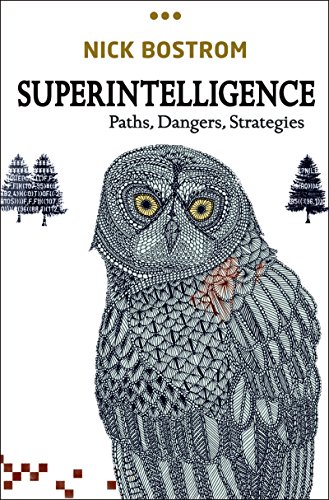8 Best-Selling AI Control Problem Books Millions Trust
Discover AI Control Problem books recommended by Bill Gates, Daniel Kahneman, and Nils Nilsson, blending expert insight with popular acclaim.





When millions of readers and leading experts converge on a select group of books, it signals something worth paying attention to. The AI Control Problem—how to ensure artificial intelligence systems remain safe, aligned, and controllable—is one of the most urgent challenges of our time. These eight best-selling books have navigated this complex terrain, offering readers a blend of profound insights and practical foresight that resonates with both professionals and engaged enthusiasts.
Bill Gates, co-founder of Microsoft, has lauded "Superintelligence" for its clear-eyed examination of AI's future risks, while Daniel Kahneman, Nobel Laureate and psychology professor, praises "Human Compatible" for its hopeful yet realistic framework on AI alignment. Meanwhile, Nils Nilsson, a pioneer in artificial intelligence at Stanford, recommends foundational works that deepen understanding of AI's potential and pitfalls.
While these influential books provide proven frameworks and widely validated perspectives, readers seeking insights tailored to their unique background, skill level, and specific AI Control Problem interests might consider creating a personalized AI Control Problem book, blending expert-backed methods with custom focus areas for maximum relevance and impact.
Recommended by Bill Gates
Co-Founder & Former CEO of Microsoft
“I highly recommend this book”
by Nick Bostrom··You?
by Nick Bostrom··You?
Drawing from his expertise in philosophy, neuroscience, and AI, Nick Bostrom explores the profound question of what happens when machines exceed human intelligence. You’ll gain insight into the nature of superintelligence, the potential paths AI development might follow, and the risks that come with it, such as loss of control over machine agents. The book challenges you to consider how humanity can influence and contain an intelligence explosion to avoid catastrophic outcomes. It's a thoughtful read for anyone interested in the future of AI and its ethical and strategic implications, especially if you want to understand the complex scenarios behind AI governance.
Recommended by Daniel Kahneman
Professor of Psychology, Nobel Laureate
“This is the most important book I have read in quite some time. It lucidly explains how the coming age of artificial super-intelligence threatens human control. Crucially, it also introduces a novel solution and a reason for hope.”
by Stuart Russell··You?
by Stuart Russell··You?
Drawing from decades of experience as a leading AI researcher, Stuart Russell challenges the conventional narrative about superhuman artificial intelligence as an inevitable threat. He proposes a fresh framework where machines remain uncertain about human preferences, ensuring they act with humility and alignment to our goals. You gain insight into the technical and ethical dilemmas of AI, from autonomous weapons to viral sabotage, alongside a hopeful blueprint for coexistence with powerful AI systems. This book suits anyone looking to understand both the risks and the design principles that could keep AI beneficial rather than dangerous.
by TailoredRead AI·
This tailored book explores the complex challenges of managing AI control problems with a focus on safety. It examines essential theories and practical approaches that have shaped the understanding of AI risk and control, while aligning closely with your background and specific interests. By concentrating on battle-tested AI control problem strategies, this personalized resource reveals how key concepts can be adapted to your goals, helping you grasp nuanced safety management techniques. Through a curated and focused narrative, the book covers everything from AI safety fundamentals to advanced control methods, ensuring a learning experience that matches your knowledge level and desired focus areas. Its tailored approach means you engage deeply with content that fits your unique journey in AI control and safety management.
Recommended by Leilani Münter
Environmentalist and Documentary Filmmaker
“@opineno @jrbarrat IMHO “Our Final Invention” is one of the best books ever written on the dangers of AI. I had the pleasure of meeting James for the first time back in 2015, just after I read his book. James is also an accomplished documentary filmmaker.” (from X)
After analyzing the rapid advances and potential risks of AI, James Barrat presents a sobering examination of how artificial intelligence might surpass human intelligence and challenge our existence. Drawing on interviews with industry insiders and profiles of cutting-edge AI systems, the book explores the motivations behind AI development and the urgent questions about control and coexistence. You gain insights into the possible survival drives of AI and the risks posed by unchecked progress, making it a must-read for anyone concerned about the future of technology. Chapters detailing the human-level intelligence threshold and the implications for society provide concrete context for these complex issues.
by Mustafa Suleyman, Michael Bhaskar··You?
by Mustafa Suleyman, Michael Bhaskar··You?
What if everything you knew about technology’s trajectory was wrong? Mustafa Suleyman, drawing from his decade at DeepMind and leadership at Inflection AI, maps a future shaped by AI’s rapid rise and its profound impact on society and governance. You’ll gain a nuanced understanding of the "containment problem," the challenge of controlling these powerful technologies before they outpace regulation. The book navigates complex topics like AI ethics, surveillance, and geopolitical risks, offering insights grounded in Suleyman’s insider perspective. If you’re grappling with how AI might reshape power structures or seeking clarity on tech’s looming dilemmas, this book offers a candid, sobering lens to sharpen your grasp.
by Vincent C. Müller··You?
by Vincent C. Müller··You?
The breakthrough moment came when Vincent C. Müller, with his extensive background leading European AI research initiatives, gathered diverse expert insights to tackle the complex risks posed by advanced AI systems. In this volume, you gain a nuanced understanding of the AI control problem through chapters that explore everything from predictions of AI's future to machine ethics and the challenge of ensuring AI remains beneficial. For example, Omohundro's analysis reveals how even seemingly harmless AI agents might unintentionally evolve into threats, while Goertzel discusses design principles for safe artificial agents. This book suits you if you're ready to engage deeply with the ethical and technical debates shaping AI's trajectory rather than seek simplified conclusions.
by TailoredRead AI·
This tailored book explores a focused 30-day journey to understanding and mitigating AI control risks, crafted to match your background and goals. It covers foundational concepts of AI safety, risk identification, and practical steps to foster safer AI systems. Through a personalized lens, it examines key challenges in AI control including alignment, ethical considerations, and governance, guiding you to gain actionable insights relevant to your interests. By concentrating on your specific objectives, this book delivers a clear, progressive pathway through complex AI safety topics, allowing you to build knowledge efficiently and confidently. Each chapter builds on prior understanding, ensuring a coherent and engaging learning experience tailored to your unique perspective.
by George Adamopoulos··You?
by George Adamopoulos··You?
During his college years in Montreal, George Adamopoulos combined his passion for computers with entrepreneurial drive to produce this thoughtful introduction to artificial general intelligence (AGI). You’ll explore foundational concepts about how machines might achieve human-like intellectual capacity and the technical challenges that lie ahead, framed within the broader quest to solve the AI control problem. The book balances accessibility and depth, making it suitable whether you’re new to AI or pursuing advanced study. Chapters detail the progression from current AI capabilities toward potential superintelligence and the implications for society, helping you understand both the technology and the stakes involved.
by Edward H. Spence··You?
by Edward H. Spence··You?
When Edward H. Spence draws from his extensive background in philosophy and ethics, he tackles the AI control problem through the lens of stoicism, offering a fresh perspective on technology's role in human wellbeing. You’ll explore how technology’s societal impact is measured not just by function but by its ethical contribution to human flourishing, guided by a model rooted in virtue ethics and rationalism. Chapters delve into the conditions necessary for technology to enhance life, questioning what genuine benefit technology holds when negative effects dominate. This book suits those grappling with the ethical dimensions of AI and seeking a philosophical framework to evaluate technological progress critically.
by HÜSEYİN GÜRKAN ABALI·You?
Hüseyin Gürkan Abali approaches the complex challenges of AI control with a methodical lens, exploring both the feasibility and the limitations of managing human-level intelligent systems. You will find detailed discussions on safety engineering principles, weighing weak and strong control solutions, alongside a thoughtful examination of AI's potential capabilities from multiple viewpoints. This book is tailored for those deeply invested in AI safety and technical governance, offering a clear-eyed analysis rather than speculative futurism. If you're looking to understand the core technical dilemmas behind AI control, this book delivers focused insights without unnecessary jargon or hype.
Proven AI Control Strategies Tailored ✨
Get popular AI Control Problem methods customized to your unique goals and challenges.
Trusted by AI Control Problem enthusiasts worldwide
Conclusion
This curated collection highlights several clear themes: the critical importance of understanding superintelligence risks, the ethical and governance challenges posed by AI, and the technical complexities of controlling powerful intelligent systems. If you prefer proven, widely endorsed methods, starting with "Superintelligence" and "Human Compatible" offers a solid foundation. For those drawn to ethical frameworks and philosophical perspectives, "Stoic Philosophy and the Control Problem of AI Technology" provides thoughtful depth.
Combining broad risk analyses like "Our Final Invention" with technical explorations in "Problems Associated with Artificial Intelligence" equips you with a multifaceted view. Alternatively, you can create a personalized AI Control Problem book to merge these proven approaches with your unique questions and goals.
These widely adopted books have helped many readers successfully navigate the complex AI Control Problem landscape. Their expert endorsements and reader acclaim underscore their lasting value in shaping how we think about AI’s future safety and control.
Frequently Asked Questions
I'm overwhelmed by choice – which book should I start with?
If you're new to AI Control Problem, "Superintelligence" offers a compelling overview of risks and strategies, while "Human Compatible" dives into AI alignment with a hopeful tone. Both are excellent entry points endorsed by Bill Gates and Daniel Kahneman.
Are these books too advanced for someone new to AI Control Problem?
Not at all. Titles like "Artificial General Intelligence" by George Adamopoulos break down complex concepts accessibly, making them suitable for beginners eager to understand AI control challenges.
What's the best order to read these books?
Start with broader risks in "Superintelligence" and "Our Final Invention," then explore alignment in "Human Compatible." Follow with technical reads like "Problems Associated with Artificial Intelligence" and ethical perspectives from "Stoic Philosophy and the Control Problem of AI Technology." This sequence builds depth gradually.
Should I start with the newest book or a classic?
Balancing both is wise. "The Coming Wave" (2023) provides fresh insights on AI governance, while classics like "Superintelligence" remain foundational. Combining contemporary and established works offers a richer understanding.
Can I skip around or do I need to read them cover to cover?
These books are structured to allow flexible reading. You can focus on chapters most relevant to your interests, whether ethical dilemmas, technical challenges, or governance, without reading every page sequentially.
How can I get AI Control Problem insights tailored to my specific needs?
Expert books provide invaluable guidance, but personalized content can address your unique background and goals. Consider creating a personalized AI Control Problem book that combines proven methods with your specific interests for efficient, targeted learning.
📚 Love this book list?
Help fellow book lovers discover great books, share this curated list with others!
Related Articles You May Like
Explore more curated book recommendations







